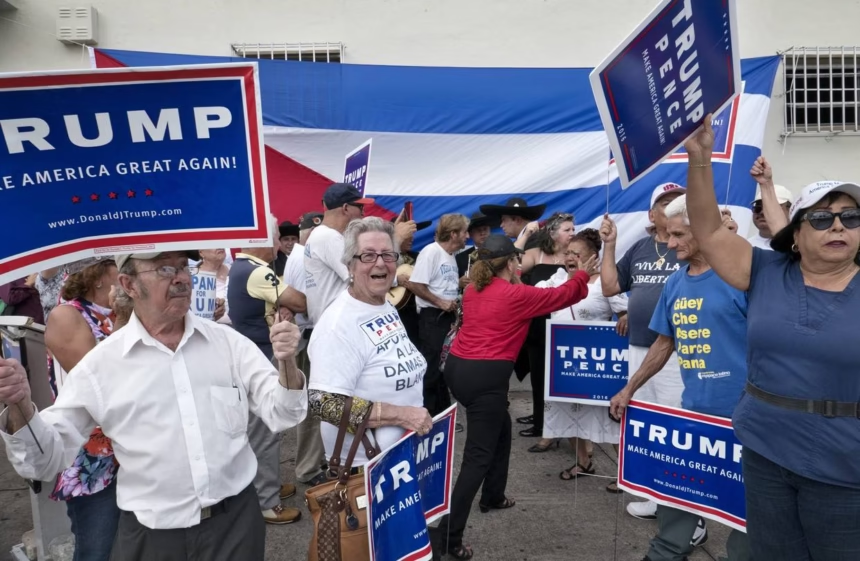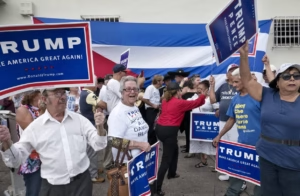President Donald Trump continues to disappoint many Cuban American voters who supported him during the November 2024 presidential election, as his new immigration policies now directly harm the very families that once trusted him to protect their interests.
Less than a year later, these voters, who believed their support would guarantee security and stability for their families, now confront Trump’s immigration restrictions that suspend long-awaited family reunification programs, revealing the sharp disconnect between their expectations and reality.
Visa denials are piling up at U.S. consulates. Interviews are being postponed indefinitely. Anxiety is spreading among families separated across the Florida Straits.
Approximately 110,000 people now face the risk of deportation to the island.
In consulates and immigration offices, that risk shows up as canceled appointments, delayed responses, and sudden rejections.
In testimonies cited by The Washington Post, Leymi Reyes Figueredo, a legal Cuban immigrant in the U.S., described the collapse of an immigration process she believed was nearly complete. Her daughter was set to join her, pending approval from the U.S. Embassy in Havana. The response was negative, with no option for appeal. “I understand why you have to protect the country [but] how is a child a terrorist?” she asked, according to The Washington Post.
The same sense of betrayal runs through other Cuban American households. Díaz Leal, another Trump supporter who had hoped to welcome his son to Florida, expressed disappointment but reaffirmed political loyalty. “I love Trump. But I don’t think it’s fair.” The contradiction is clear—faith in a political choice, but resistance to its personal consequences.
The policy at the center of this disillusionment is a new restriction under the Trump administration that limits the issuance of Family Reunification Parole and immigrant visas for Cuban nationals. The administration claims these measures serve national security by increasing screening and suspending certain interview waivers. Reports indicate that this policy change also curtails temporary protections for Cubans already residing in the U.S., including those with pending legal status under special parole programs.
Facing these obstacles, some families have turned to the courts. A legal challenge was filed to suspend denials and prompt review of pending cases. Yet Curtis Morrison, the lawyer leading the effort, noted the reluctance of Cuban Americans to sue the administration they supported. “I expected a lot of Cubans to participate in this lawsuit,” he said. “At the end of the day, they were just: ‘No, we don’t want to sue Trump.’” Many hesitate, caught between political loyalty and legal options.
Others have chosen civic visibility instead. Peaceful gatherings are being held in Miami. Families share stories of separation and display official documents, trying to persuade the administration to reconsider. “We did it in good faith, hoping it would soften Donald Trump’s heart,” explained William Suárez González. “The wife of Mr. Donald Trump is an immigrant. So I don’t understand what the issue is with immigrants who are trying to enter the country legally.”
Beyond the individual tragedies lies a broader systemic concern. Families denounce the widespread use of suspicion-based criteria, applied uniformly and without nuance. They call for clearer and public eligibility standards, humanitarian exemptions for minors and close relatives, and transparent timelines for consular appointments. Without these safeguards, they warn, prolonged uncertainty may lead some to take irregular paths they have so far avoided.
This situation exposes a deep political irony: Cuban Americans, once instrumental in advocating for tougher immigration policies through their support of Trump, are now directly hurt by those very policies. As debates continue across their homes and communities, the urgent question remains—should loyalty to the administration outweigh the need to keep families together?
Vigils and small protests continue in Miami. Photos of separated relatives are displayed in plastic sleeves. Case numbers are written on envelopes, and organizers hand out leaflets explaining how to navigate consular bureaucracy. Their message is clear: make these stories visible enough to move a policy focused on national security.
In this moment of uncertainty, reported words highlight the divide. “I understand why you have to protect the country [but] how is a child a terrorist?” asks Leymi Reyes Figueredo. “I love Trump. But I don’t think it’s fair,” says Díaz Leal. William Suárez González adds: “We did it in good faith, hoping it softens Donald Trump’s heart.”
All of these Cuban immigrants share one thing in common: they supported Donald Trump in 2024 and now face regret, as his uncompromising immigration policy impacts even his most loyal backers, making them question the consequences of their political choice.








